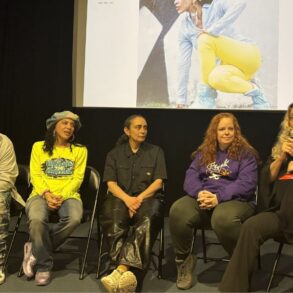Hip-hop in Brazil has always been women’s turf. From pioneers like Dina Di to mainstays such as Chris SNJ, Kmila CDD, and Negra Li, female rappers have never put the mic down since first grabbing it in the early 1990s.
Yet, despite the steady growth of Brazilian hip-hop in the last decade, women are often overlooked compared to their male counterparts — some of whom lack the skill but still enjoy the fruits of fame.
This dynamic is common in many countries, such as the U.S. and England. But, like Megan Thee Stallion and Ice Spice, Brazilian rappers are rewriting the game. In recent years, names like Ajuliacosta and Tasha & Tracie have made a mark on the country’s hip-hop scene; their solid releases fueled by sharp rhyming and performances loaded in artistry. These artists run a wide gamut of subgenres, exploring sounds as much as their lyrical horizons. Social issues, racism, sex, love, and anti-LGBTQ+phobia — there’s a lot in their lyrical arsenal.
Read more: A Timeline Of Brazilian Hip-Hop: From The Ruas To The Red Carpet
Read on for a selection of women in Brazil’s diverse hip-hop scene, a world that melds together baile funk and trap, southern beats and grime, traditional chants and fast bars. Continuing the tradition of resistance while reshaping the present and future of Brazilian hip-hop, these artists keep the mics and bars high.
Ajuliacosta
Hailing from Mogi das Cruzes, in the outskirts of São Paulo, Ajuliacosta is amongst the most relevant names of Brazilian hip-hop today. Her laidback flow and sharp pen are a statement against a rap scene used to praising ordinary speed-flow and pointless braggadocio.
AJC has performed at several festivals since her debut, 2023’s Brutas Amam, Choram e Sentem Raiva. On that record, Julia moves swiftly through her personas: the loving demoiselle, the saddened girlfriend and the merciless OG. All of that is filtered by the perspective of an independent Black woman from a favela whose flow slides on bars and reiterates words to make them stronger. Self-titled a chavosa (stylish) majesty, she sings in “Queen Chavosa”: “The hussle, it’s us. The support, it’s us. The sponsor, it’s us.”
Suav is a stylized writing of “suave,” the Brazilian Portuguese word for “smooth.” Indeed, Anna Suav’s voice can be quite soothing, with words that caress the listeners’ ears through her R&B-laced hip-hop. But Anna can also play the warrior, a fierce bar-spitter who proudly shouts out her region, the Amazon rainforest.
On “Dengosa & Brabona” — a Jersey bounce joint released in last June featuring brega funk (a variant of baile funk) MC Rayssa Dias — Anna transforms the rapid beats into a soulful bed for her warm vocals. In “Levante,” alongside fellow Northern rapper Bruna BG, she declares: “From where we come, there will be more.”
Indeed, over the past decades, artists hailing from the Amazon region have been claiming more space and recognition in the South-centered Brazilian music industry. Female hip-hop artists like Anna Suav, Bruna BG, Nic Dias and Nega Ysah are leading the front.
Áurea Semiséria
Born and raised in Salvador, Bahia, Áurea is one the most versatile contenders on the rise. Her concise, but purposeful catalog showcases an artist unafraid to bend rap according to her taste. Where spitting rhymes over the modern, percussion-laden strain of samba known as pagodão or going all-out on grime beats, Áurea wastes no bar. “My flag is black, my voice is a shotgun,” she fires in her performance in the YouTube channel Brasil Grime Show.
With the mic in hand, she not only claims a space for her own music but also for Bahia’s hip-hop scene. The state, home to Brazil’s largest Black population, has birthed several prominent rap acts, including Opanijé, Afrogueto, and Vandall.
Whether acting, writing, performing on theater stages, or improvising in an Instagram video, Bione embodies the versatility and sharpness of rap. A remarkable alumna from Slam das Minas PE — one of Brazil’s most influential poetry slams — Bione is a multifaceted talent who explores hip-hop through various forms.
Born and raised in Pernambuco, a northeastern state celebrated for its cultural richness from literature to music and carnaval, Bione first arrived on the scene in 2019. On her 2022 debut album, Ego, Bione collaborated with Mãe Beth de Oxum, a pillar of local Black traditions, and fresh voices from brega funk. On the track “Deixa as Garota Brincar,” she boldly declares, “[The male rappers] tried to make me afraid of them, but now they’re afraid of me.”
Duquesa, which translates to “duchess,” is the title young Jeysa Ribeiro chose for herself when she set out to claim her spot among Brazilian rap royalty. She is certainly living up to the name: In just a few years, the rapper from Bahia has risen from an impromptu first performance at a book release event to becoming one of the most recognizable names in Brazilian hip-hop. Her success is underscored by her nomination for Best New International Artist at the BET Awards 2024.
Whether spitting bars over a fast-paced drill beat or gliding smoothly over an R&B groove, Duquesa embraces both the blessing and the responsibility of her growing reputation: “I don’t have time (…) I’m worried about getting rich this year, everybody’s asking me about my next release,” she sings in “Turma da Duq” (“Duq’s Crew”). Her career is guided by the legendary Mano Brown, leader of the iconic Brazilian hip-hop group Racionais MCs, a weighty association she handles with ease — her talent speaks for itself.
Showing off an impressive style of grandiloquent bars and melodic, yet corrosive prosody, Ebony is a name that should not be forgotten. She has released two albums in the past three years, Visão Periférica (2021) and Terapia (2023) and has remained a significant presence in the hip-hop conversation. Whether through her clever pen in singles and features with up-and-coming names such as Urias and Carlos do Complexo or her talent for engaging in fiery debates within Brazilian hip-hop, she has stayed relevant.
One such debate she ignited herself in late 2023 with “Espero Que Entendam.” The track is a powerful diss aimed at the top-tier male rappers in Brazil, and produced in collaboration with producer Larinhx, and their male-dominated hegemony: “I told them I have bars/if I start to spit them, they will be shocked,” she rhymes.
Hailing from São Paulo’s West Side, MC Luanna blends the city’s downtempo, rap-infused baile funk with the rebellious spirit of classic hip-hop. The result is a modern, unique sound — a mix of antihero, rude girl lyrics delivered with a laid-back flow.
In her 2022 album 44, MC Luanna paints a sharp portrait of a young Black woman navigating the challenges of São Paulo. With precise rhymes, she seamlessly weaves together themes of hedonistic love, loyal friendships, and outshining her rivals with her skillful lines.
Monna Brutal
When Monna Brutal raps, it’s time to learn. In her arsenal, you’ll find a feverish pace and sharp wordplay, along with laid-back phrasing and tongue-in-cheek punchlines.
Born in Guarulhos, on the outskirts of São Paulo, Monna Brutal has been paving a solid path in Brazilian hip-hop. Her four albums (from 2018’s 9/11 to the 2024’s Vista Grossa) showcase an artist confident in her power. Monna tackles fake stars, social issues, and LGBTQIA+ discrimination with the same gnarly bite. In “Hashtag,” she spits a fiery warning: “If you try to beat me up, you’ll be my next track.”
Showing off a Slipknot t-shirt on her TikTok account, flaring neon-colored laces on a music video, and keeping her fancy nails always sharp, Slipmami won’t go unnoticed. And clothing is just a piece of the puzzle she brings to the table. The Rio de Janeiro rapper is a blend that only hip-hop could create: a cross-pollination of anime characters and precise, lascivious lines.
Her 2023 debut album, Malvatrem, is a fierce statement from a girl who knows what she wants — both in bed and in the streets. She rhymes over finger-snapping beats, dirty South jams, baile funk drums, and grim chords. Whether on tight tempos or loose trap vibes, Slipmami spares no bars and no one.
Tasha & Tracie
Brazilians of Nigerian descent, twin siblings Tasha and Tracie have been stirring up Brazilian street culture for a couple of years. They first emerged into the hip-hop world in the mid-2010s as bloggers who praised Brazilian favela sartorial style as much more than a trend — it was a lifestyle. They were right, and in 2021 they brought their life experiences to music with their debut, Diretoria.
The album sent shockwaves through Brazil’s hip-hop scene, showcasing a duo that could deliver abrasive lines and mellow double entendres, straightforward jabs, and clever wordplay. Since then, the sisters have kept their pen and mic busy via features and collaborations, such as the gritty “Drop da Santa”—a nod to São Paulo favela kids who wear Santander/Ferrari garments exclusively.
Latest News & Exclusive Videos
This post was originally published on this site be sure to check out more of their content.








